Missing teeth are a life-altering issue that can be solved with dental implant, however, some individuals experience a lot of anxiety when they think of oral surgery. Be it fear of pain, worry about anesthesia, or the fact that you just do not know what to expect, these feelings are not uncommon and are perfectly legitimate. When left unresolved this anxiety may postpone the necessary treatment, which affects your smile, as well as your long-term oral health.
Fortunately, contemporary dentistry is constructed on the comfort of patients. When there are caring providers, effective communication, and tailored sedation routes, one can overcome those fears and proceed with confidence. Knowing how it works and being sure that you are in professional hands can mean everything.
Why Dental Implant Anxiety Is More Common Than You Think

Being afraid of dental implant is not a rare thing, on the contrary, it is extremely widespread. Most patients are concerned with pain, complications, or even the concept of surgery. It can be previous unpleasant experiences in the dentists, fear of needles, or even shame in their current state of teeth. The stigma that is attached to dental problems can also deprive an individual of the ease to discuss their fears freely. The initial step in gaining control of your oral health with confidence and support is knowing you are not alone in this experience.
Psychological Barriers to Implant Surgery
The fear of dental work is usually connected to previous unpleasant experience, fear of pain, or even a second-hand account that leaves a mark. Although dental implant surgery is normal, safe, and largely successful, it is commonly viewed as a major procedure, which increases psychological stress. It is not the surgery itself that causes fear to them but the accumulation of anxiety of anesthesia, recovery, or complications.
These phobias are not necessarily factual, but they are quite real and true to those that experience them. The recognition of this anxiety is the beginning of the creation of the supportive and personalized care plan that would make you feel safe at each step of the way.
Fear of Pain, Failure, or Anesthesia: What’s Behind the Anxiety?
The major fears about dental implant are the pain experienced during or after the procedure, the fear that the anesthesia would not work or would result in undesired side effects or the fear that the dental implant would not fuse to the jawbone appropriately. Another significant source of stress is cost- many individuals doubt that the investment will actually be worthwhile in the long run. Although such fears are understandable, they may be overwhelming and even cause physical symptoms such as nausea, insomnia or panic attack in the days before an appointment. It is also significant to understand these emotional and physical responses in order to confront dental anxiety.
Social Stigma and Emotional Concerns Related to Tooth Loss
The loss of teeth is usually emotionally charged. In addition to the physical ones, it can influence the way an individual perceives himself or herself and the level of confidence they have in the social context. The necessity to have a dental implant evokes some surprises in many people, like their aging, vulnerability, or even shame. Such emotional reactions are not wrong and may escalate the anxiety related to the dental implant procedure. It is important to recognize this emotional stratum to treat the patient with understanding and care.
How Dentists Help Patients Overcome Dental Implant Anxiety

Dentists and dental specialists know that implant phobia is personal and real. This is the reason why most practices have become more caring and patient-focused in the way they administer care. Your dentist can take you through the entire process of the consultation, explain everything, and make the experience comfortable to your needs. Effective communication, pain control measures, and assurance to the emotions are some of the things that alleviate fear. Even the most scared patients can become empowered to proceed with treatment with the appropriate support.
Sedation Options for a Stress-Free Experience
Dental practitioners provide several degrees of sedation to relieve anxiety and make the process comfortable. They can choose nitrous oxide (laughing gas) to relax slightly when they are afraid of the procedure, oral sedatives that are taken prior to the procedure, and IV sedation to relax more deeply, which is best suited to patients who experience extreme dental anxiety. All these techniques are different in intensity and recovery periods. Depending on your medical history, level of anxiety and complexity of your procedure, your dentist will advise you on the safest and most effective method. The availability of such options gives the patients a sense of increased control over their treatment.
Technology That Reduces Pain and Procedure Time
The modern dental implant process is made possible by the use of modern technologies such as 3D imaging and computer-guided placement that make the process more precise and safer. These instruments enable the dentist to pre-design the operation with an unbelievable precision, saving the operation time and the unpleasant post-surgery feelings. Laser-assisted procedures are also used in most of the instances, which enhance quick healing and reduce bleeding. By introducing these innovations, the overall process of care becomes less intimidating and more efficient to the patients. The realization that the state-of-the-art care will be provided to you can do much when it comes to the reduction of dental implant anxiety.
Real-Life Testimonials and What to Expect
It may be comforting to hear experiences of other people who have been through the process. Most patients have said that the experience was much more comfortable than they had thought. When you know what to expect, which is from the initial consultation to the recovery day, much of the fear that goes with the unknown is eliminated.
Preparing Mentally and Emotionally for Dental Implants
It is absolutely normal to be nervous before a dental implant procedure, however, preparation can make a big difference. Learn what to expect; in many cases, knowing what to expect will help diminish the fear of the unknown. Talk to your dentist about any concerns to get them to customize your treatment and make you feel good throughout the process. It is also possible to do some relaxation exercises such as deep breathing, visualization, or mindfulness before the appointment. Have a support system- have someone you trust come along with you to your visit. Think of it this way, making this step is an investment in your health, confidence, and quality of living in the future.
Visualization Techniques and Mindfulness
Focused breathing, guided imagery or mindfulness apps may be potent mechanisms to relax your nervous system prior to dental implant surgery. Slow deliberate breathing is a way of lessening physical stress and silencing racing thoughts. Guided imagery can take your mind to a relaxed place, relieve stress and give you a sense of control. With visualization, which is imagining yourself with a renewed smile, eating without any problem and feeling good, you will be able to change your fear to motivation. The techniques do not only relax you; they also give you the ability to actively participate in your emotional well-being during treatment.
Supportive Communication With Your Dental Team
You must not be hurried or disregarded when presenting your concerns. A compassionate dental crew will have time to listen to you, respond to your concerns and clarify every procedure in a language that you understand. It is possible to reduce most of the anxiety related to dental implants by feeling heard and supported. Confidence in your provider makes the experience safer and more reassuring, where you are an active partner in the care.
Pre-Surgery Counseling or Coaching Resources
Other dental practices have started collaborating with therapists or anxiety coaches to help patients prior to surgery. These professionals provide coping mechanism, relaxation strategies and emotional support that cuts across procedural anxiety. One or two sessions will make a difference to get rid of fear and increase your confidence in the process of the implant.
Choosing the Right Dental Implant Provider When You’re Nervous
In case of dental anxiety, selection of the implant provider is very important. Find a dentist who is gentle and communicates well, who is a non-judgmental listener. Review what is said about the team in regard to anxious patients. Inquire on their sedation services and pre-surgery consultation. A doctor that cares about comfort, clarity, and compassion can be the difference that makes the difference in your journey.
Why Graham Park Dental’s Patient-Centered Approach Works
We know dental implant anxiety is real and we are here to assist you through it at Graham Park Dental. Whether it is your initial consultation or the final restoration, we put you at ease, make your journey clear, and give you peace of mind. We also have time to explain the process, answer your questions and provide a customized solution that would alleviate your worry at every point along the way.
How to Tell If You’re in Good Hands Before Surgery Day
Trust your gut when selecting a dental doctor. The encouraging clinic will patiently answer your questions, listen to you, and discuss every step without pressure. Choose those practices that have the latest technology, a clean and relaxing setting, and really do care about your comfort and confidence.
Frequently Asked Questions (FAQs)
1. Is it normal to feel anxious before getting a dental implant?
Yes, it’s entirely normal to feel anxious about getting dental implants. Many people experience fear related to pain, surgery, anesthesia, or simply the unknown aspects of the procedure. This anxiety can be heightened by past dental experiences or stories shared by others. The good news is that modern dental techniques make the process far more comfortable and predictable than most expect. Understanding each step of the procedure and having a compassionate dental team can go a long way in easing your concerns. Your dentist can also offer personalized options, such as sedation and emotional support, to help you feel more relaxed and confident.
2. What options do I have to avoid pain or discomfort?
There are several ways to manage discomfort and anxiety during dental implant surgery. Options include local numbing agents, oral sedatives, nitrous oxide (laughing gas), or IV sedation for deeper relaxation. Your dentist will review your medical history and personal preferences to recommend the best option for you. Most patients find that pain after the procedure is minimal and easily controlled with over-the-counter medications.
3. Can sedation dentistry help with implant-related fear?
Absolutely. Sedation dentistry has made it possible for many patients to receive dental care they once feared or avoided. Whether it’s mild relaxation through nitrous oxide or deeper calm via IV sedation, these methods are safe and effective. They help reduce anxiety, suppress discomfort, and make time seem to pass more quickly. Your dental team will guide you in choosing the right level of sedation for your needs, ensuring a smoother, more comfortable experience.
4. How long is the recovery process, and is it painful?
Recovery is typically smooth and manageable. Most patients feel only mild soreness or swelling for a few days, which can be relieved with over-the-counter pain medication. Your dentist will provide clear aftercare instructions to support healing and reduce the risk of complications. With proper care, most people are back to their normal routines within a week. Regular follow-ups will ensure your implant is healing well and integrating properly.
5. What can I do to calm my nerves before implant surgery?
Consider incorporating guided breathing exercises or using mindfulness apps to help calm your nerves before your appointment. Taking time to speak openly with your dental team and having your questions thoroughly answered can go a long way in easing anxiety. When you feel heard and supported, the fear often lessens. Visualizing your future smile, healthy, complete, and confident, can also be a powerful way to shift your mindset and stay motivated throughout the process.
Your oral health and confidence are worth investing in. If dental implant anxiety is standing in your way, know that you’re not alone, and that solutions exist. At Graham Park Dental, we’re here to guide you with care, clarity, and options that suit your comfort level. Let’s work together to make your smile goals a reality—one calm, confident step at a time. Contact us now.


